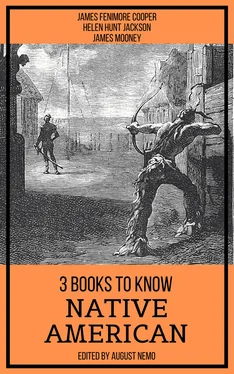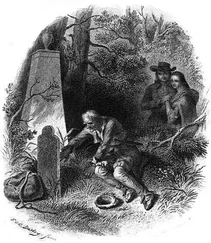“A most arbitrary, if not a hasty decision!” exclaimed Heyward, undecided whether to give vent to his growing anger, or to laugh in the other’s face. “But you speak of instruction, and of a profession; are you an adjunct to the provincial corps, as a master of the noble science of defence and offence; or, perhaps, you are one who draws lines and angles, under the pretence of expounding the mathematics?”
The stranger regarded his interrogator a moment, in wonder; and then, losing every mark of self-satisfaction in an expression of solemn humility, he answered:—
“Of offence, I hope there is none, to either party: of defence, I make none — by God’s good mercy, having committed no palpable sin since last entreating his pardoning grace. I understand not your allusions about lines and angles; and I leave expounding to those who have been called and set apart for that holy office. I lay claim to no higher gift than a small insight into the glorious art of petitioning and thanksgiving, as practised in psalmody.”
“The man is, most manifestly, a disciple of Apollo,” cried the amused Alice, “and I take him under my own especial protection. Nay, throw aside that frown, Heyward, and in pity to my longing ears, suffer him to journey in our train. Besides,” she added, in a low and hurried voice, casting a glance at the distant Cora, who slowly followed the footsteps of their silent but sullen guide, “it may be a friend added to our strength, in time of need.”
“Think you, Alice, that I would trust those I love by this secret path, did I imagine such need could happen?”
“Nay, nay, I think not of it now; but this strange man amuses me; and if he ‘hath music in his soul,’ let us not churlishly reject his company.” She pointed persuasively along the path with her riding-whip, while their eyes met in a look which the young man lingered a moment to prolong; then yielding to her gentle influence, he clapped his spurs into his charger, and in a few bounds was again at the side of Cora.
“I am glad to encounter thee, friend,” continued the maiden, waving her hand to the stranger to proceed, as she urged her Narragansett to renew its amble. “Partial relatives have almost persuaded me that I am not entirely worthless in a duet myself; and we may enliven our wayfaring by indulging in our favorite pursuit. It might be of signal advantage to one, ignorant as I, to hear the opinions and experience of a master in the art.”
“It is refreshing both to the spirits and to the body to indulge in psalmody, in befitting seasons,” returned the master of song, unhesitatingly complying with her intimation to follow; “and nothing would relieve the mind more than such a consoling communion. But four parts are altogether necessary to the perfection of melody. You have all the manifestations of a soft and rich treble; I can, by especial aid, carry a full tenor to the highest letter; but we lack counter and bass! Yon officer of the king, who hesitated to admit me to his company, might fill the latter, if one may judge from the intonations of his voice in common dialogue.”
“Judge not too rashly from hasty and deceptive appearances,” said the lady, smiling; “though Major Heyward can assume such deep notes on occasion, believe me, his natural tones are better fitted for a mellow tenor than the bass you heard.”
“Is he, then, much practised in the art of psalmody?” demanded her simple companion.
Alice felt disposed to laugh, though she succeeded in suppressing her merriment, ere she answered —
“I apprehend that he is rather addicted to profane song. The chances of a soldier’s life are but little fitted for the encouragement of more sober inclinations.”
“Man’s voice is given to him, like his other talents, to be used, and not to be abused. None can say they have ever known me neglect my gifts! I am thankful that, though my boyhood may be said to have been set apart, like the youth of the royal David, for the purposes of music, no syllable of rude verse has ever profaned my lips.”
“You have, then, limited your efforts to sacred song?”
“Even so. As the psalms of David exceed all other language, so does the psalmody that has been fitted to them by the divines and sages of the land, surpass all vain poetry. Happily, I may say that I utter nothing but the thoughts and the wishes of the King of Israel himself; for though the times may call for some slight changes, yet does this version which we use in the colonies of New England, so much exceed all other versions, that, by its richness, its exactness, and its spiritual simplicity, it approacheth, as near as may be, to the great work of the inspired writer. I never abide in any place, sleeping or waking, without an example of this gifted work. ’Tis the six-and-twentieth edition, promulgated at Boston, Anno Domini 1744; and is entitled, The Psalms, Hymns, and Spiritual Songs of the Old and New Testaments; faithfully translated into English Metre, for the Use, Edification, and Comfort of the Saints, in Public and Private, especially in New England.”
During this eulogium on the rare production of his native poets, the stranger had drawn the book from his pocket, and, fitting a pair of iron-rimmed spectacles to his nose, opened the volume with a care and veneration suited to its sacred purposes. Then, without circumlocution or apology, first pronouncing the word “Standish,” and placing the unknown engine, already described, to his mouth, from which he drew a high, shrill sound, that was followed by an octave below, from his own voice, he commenced singing the following words, in full, sweet, and melodious tones, that set the music, the poetry, and even the uneasy motion of his ill-trained beast at defiance:—
“How good it is, O see,
And how it pleaseth well,
Together, e’en in unity,
For brethren so to dwell.
It’s like the choice ointment,
From the head to the beard did go:
Down Aaron’s beard, that downward went,
His garment’s skirts unto.”
The delivery of these skilful rhymes was accompanied, on the part of the stranger, by a regular rise and fall of his right hand, which terminated at the descent, by suffering the fingers to dwell a moment on the leaves of the little volume; and on the ascent, by such a flourish of the member as none but the initiated may ever hope to imitate. It would seem that long practice had rendered this manual accompaniment necessary; for it did not cease until the preposition which the poet had selected for the close of his verse, had been duly delivered like a word of two syllables.
Such an innovation on the silence and retirement of the forest could not fail to enlist the ears of those who journeyed at so short a distance in advance. The Indian muttered a few words in broken English to Heyward, who, in his turn, spoke to the stranger; at once interrupting, and, for the time, closing his musical efforts.
“Though we are not in danger, common prudence would teach us to journey through this wilderness in as quiet a manner as possible. You will, then, pardon me, Alice, should I diminish your enjoyments, by requesting this gentleman to postpone his chant until a safer opportunity.”
“You will diminish them, indeed,” returned the arch girl, “for never did I hear a more unworthy conjunction of execution and language, than that to which I have been listening; and I was far gone in a learned inquiry into the causes of such an unfitness between sound and sense, when you broke the charm of my musings by that bass of yours, Duncan!”
“I know not what you call my bass,” said Heyward, piqued at her remark, “but I know that your safety, and that of Cora, is far dearer to me than could be any orchestra of Handel’s music.” He paused and turned his head quickly towards a thicket, and then bent his eyes suspiciously on their guide, who continued his steady pace, in undisturbed gravity. The young man smiled to himself, for he believed he had mistaken some shining berry of the woods for the glistening eyeballs of a prowling savage, and he rode forward, continuing the conversation which had been interrupted by the passing thought.
Читать дальше












